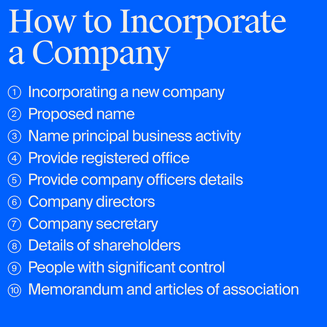Company Incorporation in the UK: A Complete Guide
- Modified: 17 June 2024
- 15 min read
- Starting a Company


Jon Mills
Business Writer
Jon relishes writing content that both educates and entertains the reader. With a background in copy and content writing for brands, he's told unique stories in creative ways, adding value to products in the luxury sector. Now, he works with our accounting experts and small business owners to bring their advice and journeys to life for Osome's readers. He aims to inspire ambitious entrepreneurs to set their sights high, and build highly-respected, flourishing businesses.
Company incorporation is perhaps the most exciting part of any entrepreneurial journey.
This is where it starts. You've got an idea, a product, a dream – but first, you need to do the company formation paperwork.
What Is Company Incorporation?
Company incorporation in the UK is the legal process of forming a new company as a separate legal entity from its owners. This involves registering the company with Companies House, the official register of companies in the UK. Once incorporated, the company is recognised as a distinct legal entity, meaning it can enter into contracts, own property, sue, and be sued in its own name.
One of the most popular company structures in the UK is a limited company. A limited company is a beneficial structure for entrepreneurs because it is completely separate from the owner. The risk to the owner is limited, meaning any debt, losses, or legal claims associated with the company are not personally their responsibility.
To simplify the process, we offer comprehensive company formation packages that make it easy to register a company and start your business journey with confidence.

The company exists as a distinct legal entity with its own business bank account and registered office. Essentially, a limited liability company is a 'person' in its own right.
In contrast, many people in the UK operate as sole traders, where the business and the owner are the same legal entity. A limited company clearly separates the individual from their business.
Forming a company offers significant benefits but also involves more administrative work. It’s a trade-off, but one worth making if you are serious about growing your business long-term.
How to Incorporate a Company in the UK?
Right, so you've decided that a limited company is the right corporate structure for you. It's a popular company structure for a reason, after all.
One big advantage is that a limited company structure clearly separates your personal finances and your business. In essence, your limited company becomes a separate legal entity, which means if things go south financially, your personal assets are typically protected.
Not only does this provide a huge peace of mind, you also look more professional in the eyes of customers, suppliers, and investors. When you see "Ltd" or "Limited" at the end of a company name, it gives off an air of stability and enhanced credibility.
Long term, it's a good move (in our humble opinion)! But company incorporation, whether a limited company or any other, requires sorting out some company details beforehand. Let's look in detail at everything you need for the company registration process.

Here's what you need to incorporate a company:
Incorporating a new company
In simple terms, incorporating a company is the process of registering your business as a limited company with Companies House, which is the UK Government's official registrar of companies.
By incorporating a limited company, you create a distinct legal identity. That is, you and your business are, essentially, separate ‘people'. If things don't go to plan, you are protected from the liabilities incurred.
Proposed name
Your business needs a name, doesn't it? Decide on a company name that really captures the essence of your new company.
You can be literal or a bit more metaphorical. Just remember, there are a few restrictions when it comes to deciding on a company name.
Any company name that suggests a link to an official body, the monarchy, or a charity cause must be approved beforehand.
Obviously, any naughty words or hate speech are also forbidden as a company name.
Name principal business activity
To identify your principal business activity, Companies House uses what's known as an SIC code or Standard Industrial Classification code. This is a unique sequence of five numbers representing a specific economic activity.
When you register your new business, you must provide at least one SIC code to describe the type of trade carried out by your limited company. If the business of your new company is varied or complex, you can use up to four SIC codes.
Provide registered office
Your business needs an official HQ or a registered office address.
This can be anywhere in your chosen jurisdiction (England and Wales, Scotland or Northern Ireland). But your company address must be a physical address in an occupied building. A PO box is not suitable.
Note, however, that this registered office address is not necessarily where you work. Your registered office can, for instance, be your adviser's or accountant's address.
Provide company officers with details
The government defines an «officer» of a UK company as a director, manager or (company) secretary. These are the people who run or own the company.
Companies House needs to know the details of these people as you carry out the company registration process. And if things change down the line, you can alter your details with Companies House.
Company directors
While LTD companies are separate legal entities, the company formation process does require it to have at least one human face or at least one director. The company director, as you may suspect, is responsible for managing your business.
While just one person/one director is sufficient, your business may also have several directors. For a UK company, the directors can also be foreigners or based overseas.
Company secretary
A company secretary's primary role is to keep your limited company compliant with the law.
In the past, you needed a specific company secretary to register a company. Today, that isn't necessary — any director can assume this role at a UK company.
However, many businesses still like to appoint a specific secretary. This is done to lighten the directors' admin workload and keep the business compliant.
Details of shareholders
This is the owner (or owners) of your business. It differs from a director (since a director is not necessarily a shareholder and vice versa). You can, however, be a shareholder and a director simultaneously.
Before incorporating your business, you need to discern what shareholders there are.
People with significant control
A person with significant control(PSC) is a person who owns or controls your limited company. A frequent term for a PSC is a ‘beneficial owner'.
When you register your limited company, you must let Companies House know who your PSCs are. If this changes, you must let Companies House know.
Memorandum and articles of association
These are the ground rules of your business.
The memorandum and articles of association set out roles and responsibilities, how directors are appointed or removed, and how meetings will be held and recorded once the company registration process is complete.
It's an important foundation for your limited company. Not just legally, but in general.
The UK government actually has model articles you can use. If you need something more bespoke, speak to an adviser or company formation agent.
Documents Required To Incorporate a Company

Application to register a company (form IN01)
The application to register a company online, formally known as Form IN01, is a crucial step in the company incorporation process in the UK. This form must be submitted to Companies House, which is the statutory body responsible for the incorporation and registration of companies. Along with the completed Form IN01, you must include the appropriate registration fee. The fee for electronic filing is £12, whereas community interest companies are required to pay £27 for their registration. Submitting the form electronically is the most efficient method, ensuring quicker processing times compared to paper submissions. Considering the Companies House workload, electronic filing expedites the registration process, ensuring your company is incorporated in a timely manner.<br>
Memorandum of association
The memorandum of association is one of the key legal company documents required when forming a business in the UK. This document is a formal agreement signed by the company’s directors, shareholders, and guarantors, indicating their commitment to forming the company and agreeing to its articles of association. The memorandum of association essentially signifies the intent of the founding members to create the company. For convenience, Companies House will generate this document for you as part of the registration process.
Articles of association
The articles of association act as the constitution for any company registered in the UK. This vital document details the internal regulations governing the company, outlining the roles and responsibilities of directors and shareholders, and specifying how the company’s daily operations will be conducted. The articles of association cover various aspects, including decision-making processes, the issuance of shares, and the rights of shareholders. For those looking for a straightforward approach, you can adopt the model articles provided by the government, which are a standardised set of rules that apply to all companies unless otherwise specified. This ensures that your company formation adheres to established guidelines without the need for drafting customised articles.
Additional information
When registering a company, it is important to be mindful of the name you choose, especially if it includes sensitive words or expressions. Certain terms are protected and require prior approval from the government before they can be used in a company name. These sensitive words typically suggest official or charitable status and could be misleading if used without proper authorisation. The list of these restricted terms is available on the .gov website, and it is advisable to review this list to ensure your proposed company name does not fall into this category. If your company name does include a sensitive word, you will need to provide additional information and justification as part of your registration application to gain the necessary approval.
Advantages and Disadvantages of Incorporating a Company
Incorporating a company in the UK can offer several advantages but also some potential drawbacks. Here is a summary of the pros and cons.
Pros of incorporation
- Limited liability protection: One of the biggest advantages of company registration or incorporation is that it provides limited liability protection for its directors and shareholders. This means that if the company goes bankrupt or is sued, the personal assets of the directors and shareholders are generally protected.
- Credibility and trust: Incorporating a company can enhance credibility and trust among customers, suppliers, and partners. A registered company is considered more established and professional than an unincorporated business.
- Access to investment opportunities: A registered company can issue shares, allowing for more flexible equity ownership than unincorporated businesses. This can make it easier to raise capital from investors.
- Tax benefits and incentives: Companies in the UK pay corporation tax on their profits, which is currently 19%. This is lower than the income tax rate individuals pay on their personal income. Many tax benefits and incentives are also available to companies, such as research and development tax credits and capital allowances.
Cons of incorporation
- Administrative responsibilities: The company formation process involves complying with various legal and regulatory requirements, such as filing annual accounts and tax returns. You will also have to seek reliable business banking partners, open a business account and ensure tax compliance. This can result in increased administrative burdens for directors.
- Set-up and maintenance costs: There are some hidden costs associated with incorporating and maintaining a limited company, such as registration and annual filing fees. You also have to keep in mind the maintaining of a registered office and obtaining a business bank account.
- Public disclosure requirements: Information about registered companies is publicly available on the Companies House website. This includes information about the company's directors, shareholders, and financial performance.
- Additional tax burden: In some cases, incorporating a company can lead to an additional tax burden. For example, if a company distributes dividends to its shareholders, they will have to pay income tax.
Overall, whether or not to incorporate a company in the UK will depend on the specific circumstances of the business and the owner's goals. Incorporating a new business may be a good option and provide great value for those looking for limited liability protection, credibility, and access to investment opportunities.
However, businesses should carefully consider the administrative responsibilities and costs involved before making a decision on going ahead with the incorporation process.
Additional Factors to Consider
When deciding whether to incorporate your business, there are several important factors to take into account:
The size and complexity of the business
The size and complexity of your business can significantly impact the decision to incorporate. Larger businesses with multiple employees, extensive operations, and higher revenue streams are more likely to benefit from the advantages of incorporation. Incorporation provides a formal structure, which can streamline operations, enhance credibility, and provide better opportunities for growth. Additionally, complex businesses, such as those with multiple divisions or subsidiaries, can also benefit from the legal and financial protections that incorporation offers, including easier access to capital and improved management of liabilities. Many company formation agents offer services that include setting up a business account and a free business bank account, simplifying the process for new businesses.
The industry in which the business operates
The industry in which your business operates can influence the necessity and benefits of incorporation. Certain industries, such as financial services, healthcare, and digital companies, have specific regulatory requirements and standards that incorporated businesses must meet. For example, financial service providers and healthcare organisations are subject to stringent regulations designed to protect consumers and ensure ethical practices. Incorporation can help businesses in these industries comply with these regulations and build trust with clients and stakeholders. Furthermore, being incorporated can also provide a competitive edge, demonstrating a commitment to professionalism and accountability. A business account tailored to your industry can further streamline financial management and compliance.
The owners' personal circumstances
The personal circumstances of business owners play a crucial role in the decision to incorporate. Owners with significant personal assets, such as property, investments, or savings, may want to consider incorporation to protect their assets from business liabilities. Incorporation creates a separate legal entity, meaning that the business's debts and obligations are distinct from those of its owners. This limited liability protection ensures that, in the event of business failure or legal issues, the personal assets of the owners are shielded from creditors and legal claims. This separation can provide peace of mind and financial security for business owners and their families. Additionally, having a London registered office address can enhance your business's prestige and legal standing.
Consulting with professionals
If you are considering registering your company in the UK, it is highly advisable to consult with an accountant or solicitor. These professionals can provide valuable insights and guidance on the implications of incorporation, helping you to understand the legal, financial, and regulatory requirements involved. An accountant can assist with financial planning, tax considerations, and compliance issues, while a solicitor can help with legal documentation, company formation, and understanding the responsibilities of company directors and shareholders. Many company formation agents also offer packages that include setting up a London registered office address and a business account, further simplifying the process. Engaging with these experts will help you make an informed decision and choose the right business structure that aligns with your goals and circumstances.
By carefully considering these factors and seeking professional advice, you can make a well-informed decision about whether incorporation is the right step for your business, ensuring long-term success and stability.
FAQ
How to incorporate a private limited company?
To incorporate a limited company in the United Kingdom, you must start an application with Companies House. Companies House is the official registrar of companies, appointed by the UK government.
This body is the sole registrar in the UK. No other organisation can register a business in the UK.
If a company is incorporated what does it mean?
To be 'incorporated' means Companies House has your business on its records.
When your limited company is registered, this creates a legal entity that is separate from you. Meaning that you are protected - as a private individual - if things don't work out.<br>
How to check the status of company incorporation?
It's all online! You can find the details of a business's status via the Companies House website.
You can get details on a company's: registered office address, current and resigned officers, previous names and trade status. You can also set up email alerts for when anything changes.<br>
How to find out where a company is incorporated?
Check on Companies House's web portal. Type in a company's name or, if you know it, a director's name and hit search. The web portal will give you information on a registered address. Whichever country that address is in, is where the company is registered.
How to find the date of incorporation of a company?
Again, look online. Companies House web portal will offer the answers you're seeking. Among lots of other details, the web portal will show you the who, what, where and when of any incorporated UK companies.
If it's on the Companies House website, you know it's accurate.
How many shares should a startup company authorise at incorporation?
There's no 'right' answer here.
You need to issue at least one share. And there is no limit to how many shares you can issue, how much share capital you can raise or the number of shareholders you can have. Just be conscious to not dilute the ownership of your business too much.
When should you form a business?
Deciding on company formation is a big deal and it depends on a lot of factors like your business idea, goals, and personal situation.
The right time to start your company formation might be different from someone else's. So, it's important to research, plan carefully, and weigh the pros and cons before diving into entrepreneurship.
Company formation is a huge commitment, so it's in your best interest to take your time and make a thoughtful decision that aligns with your goals and situation.
More like this
Get expert tips and business insights
By clicking, you agree to our Terms & Conditions, Privacy and Data Protection PolicyWe’re using cookies! What does it mean?






